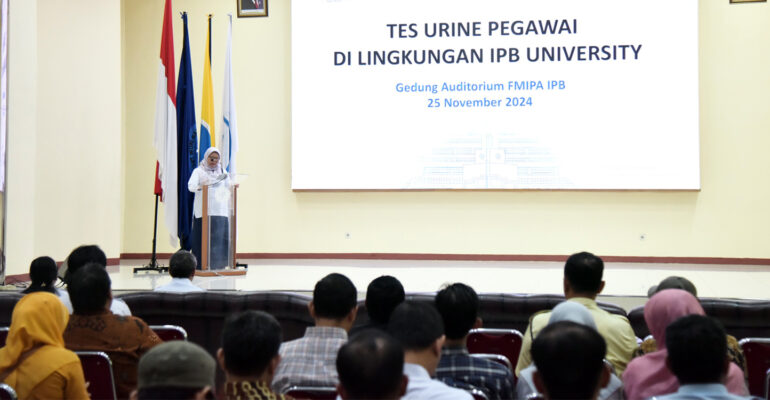Realizing Drug-Free Campus, 216 IPB University Employees Take Urine Tests

A total of 216 employees of IPB University took the urine test held at the Auditorium of the Faculty of Mathematics and Natural Sciences (FMIPA), IPB Dramaga Campus, Bogor (25/11). This activity aims to ensure that the campus environment is free from drug abuse.
Chief of IPB University Health Unit, drg Titik Nurhayati said that urine examination in IPB University environment is an important step in keeping the campus free from drugs.
This activity was attended by lecturers and education staff (tendik), with a target of six percent of the number of employees.
“The examination is carried out randomly in various units or faculties. This is part of the risk mitigation efforts to ensure that the campus environment remains clean and healthy,” said drg Titik.
She hopes that this step is part of a joint effort to create a campus atmosphere that is safe, healthy, and free from drug threats. “Hopefully this activity will run smoothly and provide benefits for the entire academic community of IPB University,” she said.
Chief of the Rehabilitation Team, National Narcotics Agency (BNN) Bogor Regency, Imam Maulana, SKM said that the implementation of early detection through drug testing has an important role to support the prevention of narcotics abuse.
He explained that there are three main functions carried out, namely community empowerment, rehabilitation, and eradication.
“We are sure this activity will run smoothly, and the test results show that no one is positive. Even if someone is detected positive, we will refer to Article 54 of Law Number 35/2009 on Narcotics, which states that addicts and victims must undergo medical and social rehabilitation,” he said.
Imam also emphasized the importance of guidance and rehabilitation for detected individuals.
In addition, this activity is a follow-up to Presidential Instruction Number 2 of 2020 concerning the National Action Plan for the Prevention and Eradication of Abuse and Illicit Trafficking of Narcotics (P4GN) and narcotics precursors for the period 2020-2024.
“We are also preparing the P4GN National Action Plan for the 2025-2029 period. Hopefully this activity can run well and become a concrete step in supporting drug prevention efforts,” he concluded. (dr/Rz) (IAAS/NAU)



